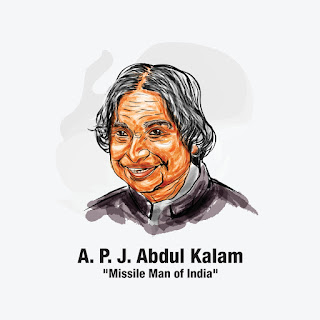Avul Pakir Jainulabdeen Abdul Kalam, also known as APJ
Abdul Kalam, was an Indian aerospace scientist and politician who served as
the President of India from 2002 to 2007. He was widely known as the
"Missile Man of India" for his contributions to the development of
ballistic missile technology in the country. Kalam's success story is one of
perseverance, hard work, and a commitment to serving his country.
Kalam was born on October 15, 1931, in Rameswaram, Tamil
Nadu, India. His father was a boat owner and imam of a local mosque, and his
mother was a housewife. Despite coming from a humble background, Kalam was an
avid learner and was always curious about the world around him. He was
particularly interested in science and technology, and his passion for these
subjects would shape his future career.
Kalam started his career as a scientist in 1958, when he
joined the Defence Research and Development Organisation (DRDO). He initially
worked on designing and developing small aircraft, but soon became involved in
the development of ballistic missile technology. Kalam played a key role in the
development of India's first satellite launch vehicle (SLV-III) in the 1970s
and was later instrumental in the development of the Agni and Prithvi missiles.
Kalam's success as a scientist was not without its challenges.
He faced numerous obstacles and setbacks along the way, but he remained
committed to his work and persevered through difficult times. Kalam was a
strong believer in teamwork and collaboration and worked closely with his
colleagues to achieve their goals. He was also known for his humility and his
willingness to learn from his mistakes.
In addition to his work as a scientist, Kalam was also a
prolific writer and a popular public speaker. He wrote several books, including
Wings of Fire, an autobiography that chronicles his life and career. Kalam was
also a motivational speaker and often spoke to young people about the
importance of education, hard work, and perseverance.
Kalam's contributions to Indian science and technology were
widely recognized, and he was awarded numerous accolades and honours throughout
his career. He was awarded the Padma Bhushan in 1981, the Padma Vibhushan in
1990, and the Bharat Ratna, India's highest civilian award, in 1997. Kalam was
also awarded several honorary doctorates from universities around the world.
Kalam's success as a scientist and a public figure was not
limited to India. He was a respected figure on the world stage and was widely
admired for his contributions to science and technology. In 2002, Kalam was
elected as the President of India, becoming the first scientist to hold the
position. During his tenure, Kalam worked to promote education, rural
development, and technological advancement in India.
Despite his many achievements, Kalam remained humble and
grounded throughout his life. He was known for his simple lifestyle and his
commitment to serving his country. Kalam passed away on July 27, 2015, while
delivering a lecture at the Indian Institute of Management Shillong. His death
was widely mourned in India and around the world, and he is remembered as a
great scientist, a visionary leader, and a true patriot.
In conclusion, APJ Abdul Kalam's success story is one of perseverance, hard work, and a commitment to serving his country. His contributions to Indian science and technology have left a lasting impact on the country and the world. Kalam's life and career serve as an inspiration to young people everywhere, and his legacy will continue to inspire generations to come.

Comments
Post a Comment